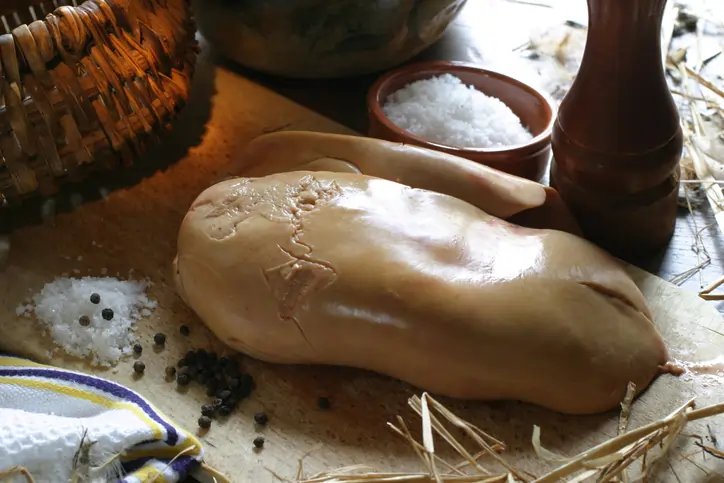Foie Gras Substitute Market is Expected To Rise CAGR of 5.3% With a US$ 474.1 Million By 2034


The foie gras substitute market is rapidly growing, driven by ethical and environmental concerns. Expected to rise from US$281.8M in 2024 to US$474.1M by 2034, plant-based alternatives are increasingly popular worldwide.
The foie gras substitute market is rapidly growing, driven by ethical and environmental concerns. Expected to rise from US$281.8M in 2024 to US$474.1M by 2034, plant-based alternatives are increasingly popular worldwide.
According to a recent Fact.MR report, the global Foie Gras Substitute Market is expected to reach US$ 474.1 million by the end of 2034, growing at a compound annual growth rate (CAGR) of 5.3% from its estimated US$ 281.8 million in 2024.
In recent years, the global culinary landscape has witnessed a dramatic evolution. Consumers are increasingly scrutinizing the origins and production methods of the foods they enjoy. One of the most contentious delicacies under the microscope is foie gras, an opulent treat traditionally derived from the livers of ducks or geese. With growing ethical concerns regarding the force-feeding process—known as gavage—there has been a marked shift toward plant-based alternatives that can replicate the rich taste and texture of traditional foie gras without compromising on animal welfare.
The Emergence of Foie Gras Substitutes:
The market for foie gras substitutes has been buoyed by several factors, chief among them being the rising consumer consciousness about animal welfare and environmental sustainability. As ethical eating becomes more than just a trend, consumers are looking for products that mirror the indulgence of traditional foie gras while ensuring that no animals are harmed in the process. This shift has paved the way for innovative vegan alternatives made primarily from legumes, grains, oils, and natural flavorings.
The transition from animal-based products to plant-based options is reflective of broader dietary changes. Increasingly, people are adopting vegetarian and vegan lifestyles for health reasons as well as to reduce their carbon footprint. As the global community becomes more aware of the environmental impact of meat production—including deforestation, high water usage, and greenhouse gas emissions—plant-based products are steadily gaining traction. In this context, foie gras substitutes not only cater to ethical concerns but also to a growing demand for healthier, more sustainable food choices.
Click to Request a Sample of this Report for Additional Market Insightshttps://www.factmr.com/connectus/sample?flag=S&rep_id=9796
What is Vegan Foie Gras?
At its essence, vegan foie gras is a carefully crafted alternative designed to replicate the rich, creamy texture of traditional foie gras. These substitutes are typically made from a blend of plant-based ingredients such as legumes, grains, oils, and an assortment of natural flavorings. The goal is not simply to mimic the taste but to provide a comparable sensory experience that can stand toe-to-toe with its animal-derived counterpart.
By utilizing advanced food technology and innovative processing techniques, manufacturers can refine these ingredients into a product that appeals even to the most discerning palates. The resulting vegan foie gras offers a guilt-free indulgence, allowing consumers to partake in the luxurious experience of foie gras without the ethical baggage associated with conventional production methods. This development is a testament to the evolving nature of food science and its capacity to transform traditional culinary practices into more ethical, sustainable alternatives.
Foie Gras Substitute Market Key Companies Profiled:
Factors Driving Demand for Foie Gras Substitutes
Several factors are converging to drive the demand for foie gras substitutes in today’s market. A key element is the growing awareness about animal treatment in food production. As consumers become more educated about the ethical implications of force-feeding, many are turning away from traditional foie gras in favor of cruelty-free alternatives. This ethical shift is accompanied by a broader trend towards plant-based diets, which are often championed for their environmental benefits and health advantages.
Another driving force is the significant reduction in the environmental impact associated with plant-based production. Traditional foie gras production has been linked to ecological issues such as deforestation and high water consumption. In contrast, the production of plant-based substitutes, particularly those based on mushrooms and nuts, tends to have a much lower ecological footprint. This sustainability factor is resonating with consumers who are increasingly aware of the environmental costs of their food choices.
Technological advancements also play a crucial role in the market’s growth. Continuous improvements in ingredient formulation and processing techniques have enabled manufacturers to develop foie gras substitutes that closely emulate the taste and texture of traditional products. These technological breakthroughs not only enhance the quality of the substitutes but also broaden their appeal among consumers who are searching for innovative and satisfying plant-based options.
Celebrity endorsements and the increasing prevalence of gourmet plant-based dining experiences have further bolstered market growth. Renowned chefs and culinary influencers are championing these alternatives, helping to elevate their status within the high-end dining scene. This trend underscores the fact that ethical and sustainable choices need not come at the expense of quality or luxury.
Regional Insights: North America, United States, and France
Different regions are experiencing the shift toward foie gras substitutes in varied ways, reflecting local cultural and regulatory landscapes. North America, for instance, has emerged as a major revenue contributor in the global market. In 2023, the region accounted for approximately 22.3% of the global foie gras substitute market share, a figure that is expected to grow in the coming years. The widespread acceptance of meatless alternatives in countries like the United States and Canada is largely driving this growth.
In the United States, ethical, environmental, and legal considerations are particularly influential. Certain states, such as California, have implemented bans on traditional foie gras production due to concerns over animal cruelty. This regulatory environment, combined with a growing consumer base that values ethical food choices, has spurred innovation in the development of foie gras substitutes. Companies like The Better Meat Co. have been at the forefront of this movement, introducing innovative mycoprotein-based alternatives that have found favor in upscale dining establishments. The U.S. market, with its projected CAGR of 4.6% from 2024 to 2034, is a prime example of how consumer demand can drive both product innovation and regulatory change.
France presents a unique case in the foie gras substitute narrative. Known globally for its culinary heritage, France’s strong cultural ties to traditional foie gras make the introduction of substitutes particularly challenging. Nonetheless, a growing awareness of ethical and environmental issues is gradually reshaping consumer attitudes. In 2023, the French market was valued at US$ 19.3 million, and although traditional foie gras continues to be a staple, there is a noticeable uptick in the demand for more sustainable and humane alternatives. Renowned chefs and local artisanal producers are actively experimenting with mushroom and nut-based substitutes, creating products that resonate with consumers while respecting traditional French flavors and techniques.
Get a Custom Analysis for Targeted Research Solutions:https://www.factmr.com/connectus/sample?flag=S&rep_id=9796
Category-wise Insights: The Rise of Mushroom and Nut-Based Substitutes
Among the various alternatives available, mushroom and nut-based foie gras substitutes are gaining particular traction. These products are estimated to account for 60% of the market share in 2024, a figure that is expected to grow to 64.4% by 2034. The increasing preference for these substitutes is primarily due to their lower ecological footprint compared to traditional foie gras production. Mushrooms and nuts, being plant-based, require significantly less water and land, and they generate fewer greenhouse gas emissions. This makes them an attractive option for environmentally conscious consumers.
The appeal of mushroom and nut-based substitutes extends beyond their sustainability credentials. These alternatives are being meticulously crafted to mirror the luxurious mouthfeel and flavor profile of traditional foie gras. Innovations in food technology have allowed manufacturers to experiment with various ingredient combinations, resulting in products that not only satisfy the palate but also offer a sophisticated culinary experience. In the competitive landscape of gourmet foods, the success of these substitutes is a clear indicator of the market’s shift towards more ethical and sustainable dining options.
Competitive Landscape and Industry Collaborations
The competitive landscape in the foie gras substitute market is dynamic and marked by a spirit of innovation. Leading companies in the field are not only focusing on product development but are also forming strategic collaborations to enhance their market presence. For example, Prime Roots, a well-known vegan brand based in Berkeley, California, has partnered with a renowned French charcuterie maker to create a pioneering line of plant-based koji-pâtés and koji-foie gras. This collaboration highlights how cross-cultural partnerships can yield unique culinary creations that appeal to a global audience.
Similarly, Japanese food tech firm Dr. Foods Inc. made headlines when it launched what it claimed was the world’s first plant-based foie gras produced through microorganism cultivation. After a successful debut in Japan, the company expanded its reach into the North American market, where innovative plant-based offerings are increasingly welcomed by restaurants and upscale dining establishments. Such strategic moves are not only driving market growth but also setting new benchmarks for product quality and sustainability.
The report by Fact.MR also provides detailed insights into the pricing strategies, sales growth, production capacity, and potential technological advancements of key manufacturers. Companies like Nestlé, Terre Exotique, and The Better Meat Co. are investing in research and development to improve their formulations and expand their product lines. As these brands continue to innovate, they are helping to reshape consumer perceptions and broaden the appeal of foie gras substitutes across various market segments.
Explore More Related Studies Published by Fact.MR Research:
The global Canned Wine Market size is projected to increase from a valuation of $280 million in 2023 to US$ 870 million by 2033-end.
The Sports Supplement Market is expanding from an estimated $8.92 Bn in 2024 to a colossal $27.89 Bn by 2034, fueled by an impressive CAGR of 12.1%.
The Emulsifier Market is expanding from an estimated $3.74 billion in 2024 to a colossal $6.27 billion by 2034, fueled by a CAGR of 5.3%.
Millets Market size to reach US$ 23.83 Bn, register at CAGR of 5.3% by 2033. Pearl millets are expected to remain preferred among products by consumers.
EPA and DHA Omega-3 Ingredient Market is valued at US$ 3.06 billion in 2023. The global revenue is projected to reach US$ 6.13 billion by 2033.
Edible Insects for Animal Feed Market is expanding from an estimated $5.14 Bn in 2024 to a colossal $40.67 Bn by 2034, fueled by an impressive CAGR of 23%
Vegan Cheese Market is expanding from an estimated $3.58 billion in 2024 to a colossal $8.1 billion by 2034, fueled by an impressive CAGR of 8.5%.
Mezcal Market currently stands at a value of US$ 386.5 million in 2023. The global revenue is forecasted to increase at a CAGR of 14.1% by 2033.
Explore more articles in the Research Reports category











